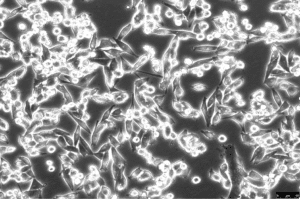The use of E0771 cells in cancer metastasis research is rapidly increasing in popularity. Researchers are attracted to the aggressive nature and immune system evading properties of the cells. One of the main interests of researchers using these cells is the role of immune cell antitumor functions in the regulation of cancer spread.
Immune Responses
It is common to use E0771 cells to examine how immune responses affect the growth of cancer cells. In one such study, ranitidine was used to show the importance of histamine receptors to breast cancer antitumor immunity [1]. Ranitidine reduces tumor immune suppression by inhibiting histamine receptors on E0771 cells. When using this inhibitor, Rogers et al. analyzed changes in the B-cell related responses of the animals. This study showed that ranitidine decreases the number of B-cells in the lymph nodes while increasing the number of antitumor antibodies. It also showed that the ability of the immune system to effectively decrease the size of the tumors is B-cell dependent. So, future breast cancer therapeutic research might focus on B-cells.
Therapeutic Testing
E0771 has been used frequently in studies which test the effectiveness of potential therapeutic compounds. These types of tests are important steps to determine whether a compound is promising enough to proceed through the product development process. The compound EB-3D is a potential candidate for an aggressive breast cancer therapeutic [2]. It is a novel form of choline kinase α1 which inhibits the synthesis of phosphocholine, an important precursor to phosphatidylcholine in the eukaryotic cell membrane. Testing on E0771 was a crucial step to this discovery. Mariotto et al. decoded the mechanism through which EB-3D activates the AMPK metabolic sensor and affects mTORC1 downstream targets. When applied to an established E0771 tumor, it was able to slow the growth and metastatic development of the tumor as well as decrease the size of existing tumors.
– Written by Nicole Cavanaugh
Works Cited
[1] Rogers, D. et al. (2018). Ranitidine Inhibition of Breast Tumor Growth Is B Cell Dependent and Associated With an Enhanced Antitumor Antibody Response. Frontiers in Immunology.
[2] Mariotto, E. et al. (2018). Choline Kinase Alpha Inhibition by EB-3D Triggers Cellular Senescence, Reduces Tumor Growth and Metastatic Dissemination in Breast Cancer. Cancers, 10(10).

